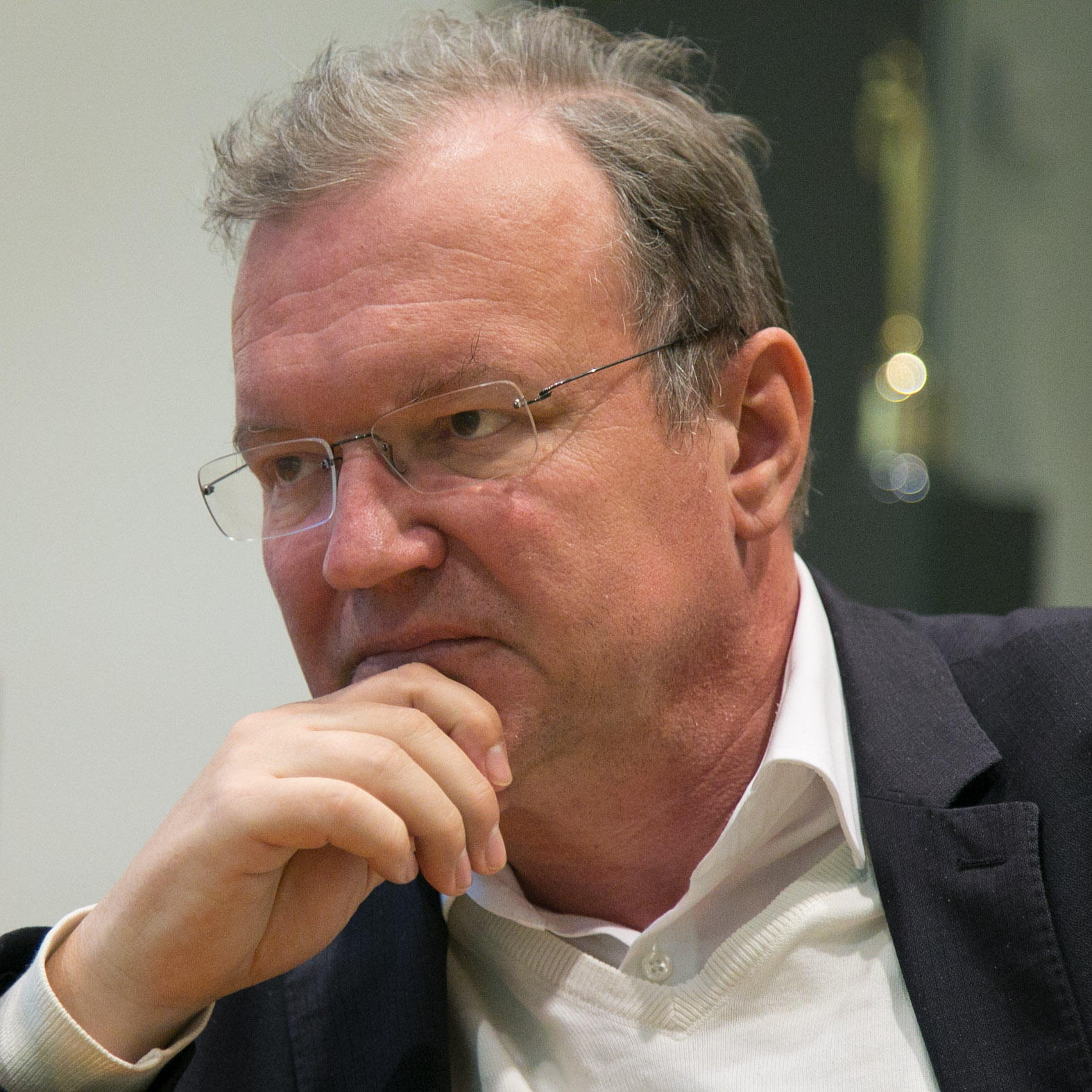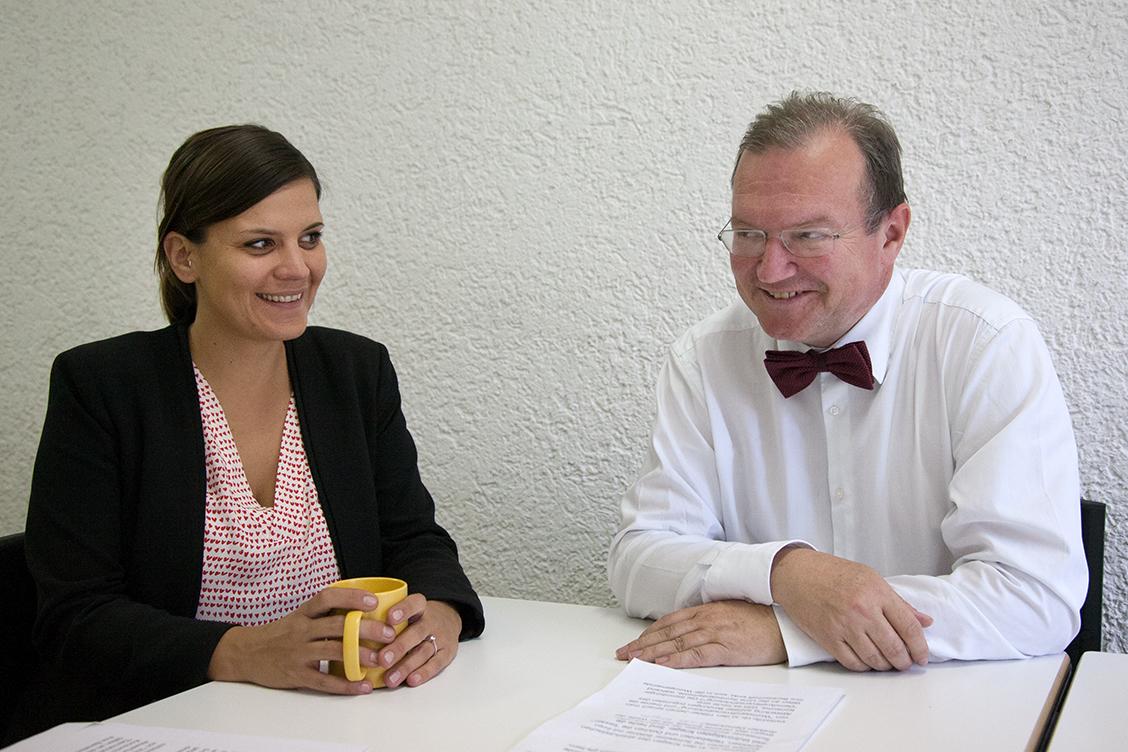Why the voice of citizens counts before they vote

Engaging opponents in political projects at an early stage before voters have the final say is the biggest strength of Swiss-style direct democracy, says political commentator and pollster Claude Longchamp.
The 59-year-old political scientist stepped down as director of the leading GfS Bern research and polling institute earlier this year. He will remain chairman until 2019.
Longchamp, known to many television viewers as “the man with the bow tie”, has an undeniable expertise of nationwide votes in Switzerland. He talks to swissinfo.ch about direct democracy, the role of the people, political parties and the challenges of digital democracy.
swissinfo.ch: Citizens around the world increasingly view democracies as something troublesome rather than as systems that can solve political problems. What went wrong?
Claude Longchamp: Democracies are synonymous with a big promise – to guarantee economic prosperity. Since the 19th century, they have also become a political means of engaging citizens and the business community in the interests of the general public.
However, this has changed. China, which is ruled by a single party, has the highest economic growth. Meanwhile, many Western-style democracies are struggling to avoid recession. This fuels criticism about the political elite, which appear to be neglecting the real needs of the population.
As a result, state democracies has been facing increasing pressure. But to this day there is no other system to replace it.
swissinfo.ch: Over the past 15 years, the conservative right Swiss People’s Party has become the strongest political group in the country, with just under 29% of the vote in the last parliamentary elections. It has pledged to make citizens become the supreme power. To what extent have Swiss citizens benefited from the rightwing party’s rise to power?
C.L.: The question is, do citizens really want to be the supreme power? Several proposals by the People’s Party were massively rejected in nationwide votes over the past few years. Neither an initiative to let people elect the government [instead of parliament] nor a proposal to have the final say on international treaties won more than 25% of the vote.

swissinfo.ch: How much power do Swiss voters really have?
C.L.: They hold a very strong position. Their ballot box decisions on people’s initiatives are enshrined in the Swiss Constitution.
Even if it is up to parliament to set laws to implement constitutional amendments, Swiss voters have more options than citizens in traditional parliamentary democracies.
In some cases, the Swiss system may be cumbersome, but political scientists would agree that is a method to balance out different interests and to strengthen both the political system and the authorities.
But the point of such a political system is that the authorities had to learn to take into account possible opposition by the people. [As they can reject proposals at the ballot box or launch their own initiatives].
In other words, the mere possibility of voters’ rejection is key, while the actual decision almost secondary for the political system.
This potential threat for the authorities gives voters the power from an abstract perspective. I think the biggest asset of the Swiss political system is that the government and parliament have to anticipate public opinion. It is crucial that politicians have to reckon with the people even before an issue is put to a nationwide vote.
swissinfo.ch: As you look back over the past 30 years as commentator and analyst of Swiss politics, how has the role of political parties changed?
C.L.: Under the traditional system of compromise and agreement in the 1980s, parliamentary committees acted as campaign groups ahead of nationwide votes. This is no longer possible 25 years on. The dynamics of shaping the public opinion have changed and become more important.
The main beneficiaries of this development are the government and interest groups.
The Swiss system has been going through a transformation over the past three years. In March 2013, voters clearly approved an initiative to cap excessive manager salaries, against the recommendations of the government, parliament and the business community.
This marked the beginning of a new form of grassroots political campaigning. It uses social media and focuses on personalised and reliable communication.
swissinfo.ch: The political instrument of the people’s initiative is marking its 125th anniversary this year. This democratic right was enshrined in the Swiss constitution in 1891. But is it ready to face the challenges of the digital age?
C.L.: There is criticism that proposals can be launched about almost anything, even if the text of an initiative is full of mistakes and does not really make sense.
Reforms are needed to ensure that voters are not asked to decide on proposals which can’t be implemented and which have to be annulled. Preventive rules could help in order to set the conditions for applying an initiative once it has been approved by voters.
Then there is the issue of how citizen’s signatures, which are needed to force nationwide votes, are gathered. The internet era has opened new possibilities for campaigning.
It is apparently possible to win the support up to 10,000 citizens in one day if a topic has strong public appeal and with the necessary marketing instruments.
In other words, it wouldn’t take more than two weeks to collect the necessary number of signatures [at least 100,000 to be collected within 18 months under current law].
These new technical possibilities undoubtedly have a huge impact on the process of opinion-shaping. It will lead to a debate about whether the current system of signature-collecting, dating back to the 19th century, needs an overhaul.
swissinfo.ch: This suggests that the fight over democratic rights continues. What are the best conditions for a functioning and robust democracy?
C.L.: It is not just a foreign audience that has to be reminded that citizen’s participation did not fall from the sky in Switzerland. The idea that the country has been living comfortably in a system of direct democracy since 1291 is wrong.
In reality, the Liberals won their first big victories for democracy in the Swiss cantons back in 1830. Switzerland became a pioneer of representative democracy with the first federal constitution in 1848.
Movements fighting for more democracy, freedom, social justice, environmental rights or gender equality have often existed before political parties tackled these issues.
These civil society groups never cease to believe in the possibilities of direct democracy and in the advantages of democracy.
The political parties, associations or the media have their specific roles organising, implementing and covering the process of direct democracy. But civil society is the main driver of democratization and of the public awareness.
These groups help us redefine regularly our understanding of democracy. This is fundamental for the functioning of the political system.
This is a shortened version of an article originally published by swissinfo.ch in German. If you wish to read the full interview click here.
Adapted from German by Urs Geiser

In compliance with the JTI standards
More: SWI swissinfo.ch certified by the Journalism Trust Initiative















You can find an overview of ongoing debates with our journalists here . Please join us!
If you want to start a conversation about a topic raised in this article or want to report factual errors, email us at english@swissinfo.ch.